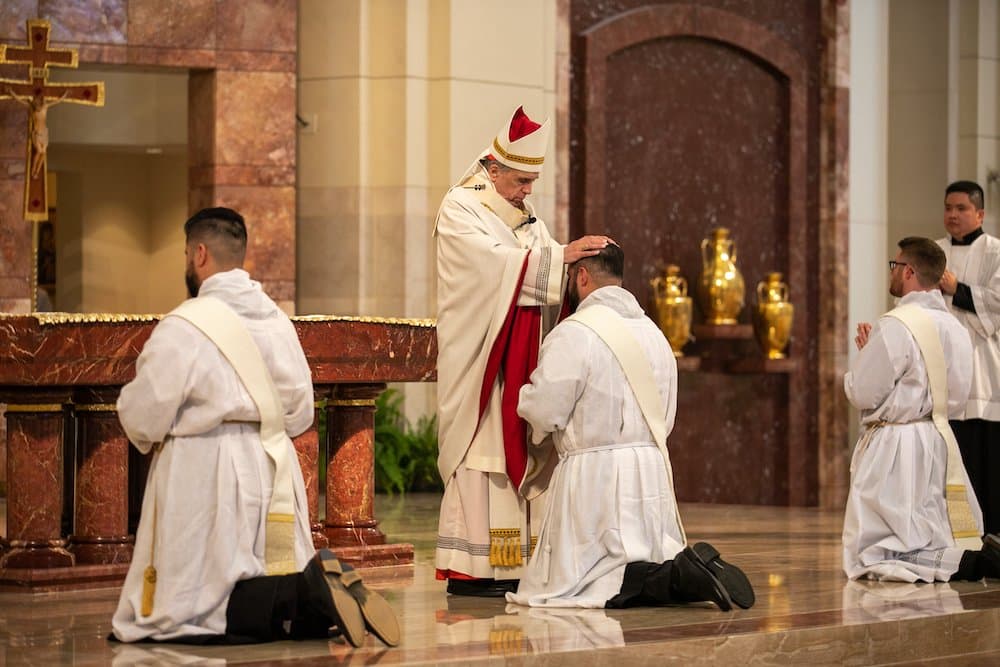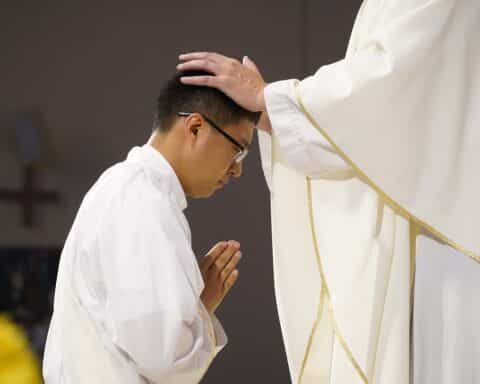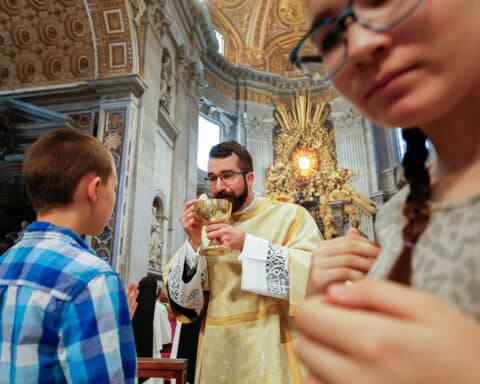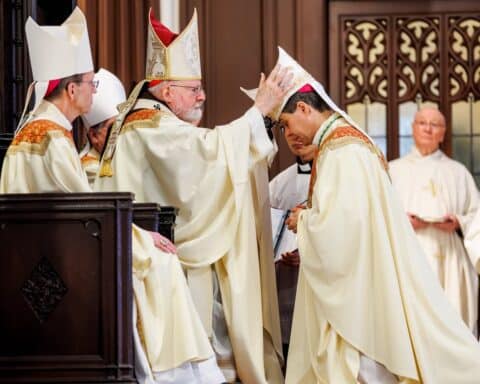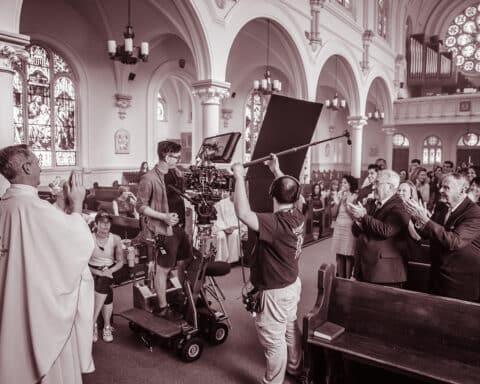In this season of priestly ordinations, I am reminded of the mysterious passages in sacred Scripture related to the high priest, Melchizedek, who makes a brief appearance in Genesis 14:18-20, and then vanishes. “Melchizedek … brought out bread and wine, and being a priest of God Most High, he blessed Abram with these words: Blessed be Abram by God Most High, the creator of heaven and earth. And blessed be God Most High, who delivered your foes into your hands.” By blessing Abraham, he blesses by proxy all of Abraham’s descendants, both according to the flesh and the spirit. That is the only narrative reference to Melchizedek in the Bible. He emerges as though from nowhere and never appears again. In the structure of the Genesis account, he has no beginning and no end. He just “is.”
This is not, however, the only place that Melchizedek is mentioned in the Bible. To the contrary, subsequent references to him deepen both the mystery and the profound importance of this priest who enters history but is not confined by it. King David’s messianic prophecy in Psalm 110:4, for example, declares, “The Lord has sworn and will not waver: ‘You are a priest forever in the manner of Melchizedek.'” The psalmist interprets the Genesis account as establishing an eternal priesthood represented by, but not limited to, the trans-historical priest, Melchizedek. He is the form of the eventual messianic priesthood of Christ, himself.
In turn, the psalmist’s reference to the timeless characteristic of Melchizedek’s priesthood is the foundation for the author of the Epistle to the Hebrews, who develops the theme more fully in reference to Christ. “Without father, mother, or ancestry, without beginning of days or end of life, thus made to resemble the Son of God, he remains a priest forever” (Heb 7:3). Melchizedek’s is a “type” of priesthood that is fulfilled by its “anti-type,” Jesus Christ, who “is always able to save those who approach God through him, since he lives forever to make intercession for them” (Heb 7:25). “It was fitting that we should have such a high priest,” the author continues, “holy, innocent, undefiled, separated from sinners, higher than the heavens” (Heb 7:26). As such, Christ is “the source of eternal salvation for all who obey him” (Heb 5:9). Fulfilling the blessing by Melchizedek of Abraham, Christ is the blessing to all humankind.
These are among the scriptural references that inform the Rite of Ordination of Catholic Priests, celebrated around the world every Easter season. The “order of Melchizedek” is comprised of those men who have responded to God’s call of selfless service and ministration of the Sacraments of the Church. As such, our priests share in the priesthood of Christ, anticipated by Melchizedek. The priest is unique among humans, ontologically changed by his ordination for participation in this eternal priesthood. In the exercise of the sacraments, priests are in persona Christi, bringing to time and space the mysteries that are eternal and immeasurable. The summit of those mysteries, of course, is the Eucharist, where Christ is made present by those ordained to stand in his place.
But ordination season also always brings to mind Graham Greene’s novel, “The Power and the Glory,” perhaps Greene’s most profound work. With its deep probing of the religious psychology of its characters, “The Power and the Glory” is often compared to Dostoyevsky’s “The Brothers Karamazov” and “The Idiot.” I have often given copies of the book as ordination gifts to my (former) seminary students upon their ordinations, both for its compelling narrative and theological sophistication. For new priests, the novel is both a cautionary tale and an exhortation of the profound responsibility that they have accepted.
“The Power and the Glory” is the account of a Catholic priest, living in a state of revolutionary Mexico in which the Church has been outlawed. The nameless priest recognizes both the privilege and burden of his eternal priesthood. Pursued by the police and taunted by unbelievers, he persists in celebrating the Sacrament of the Eucharist, even at risk of his life. He leaves the relative safety of a sanctuary state, for example, to return to his own flock, where he is an outlaw simply by virtue of his orders.
But the priest of “The Power and The Glory” is very far from “holy, innocent, undefiled.” On balance, in fact, his vices seem to outweigh his virtues. While unnamed in the novel, he is usually referred to as the “Whiskey Priest,” which gives an indication of one of his several frailties, all of which are meticulously cataloged in the novel. In addition to compromising his own ministry, his personal failures are sometimes a scandal to others, bringing shame upon himself and the Church. In most aspects of his life, this priest is not one that we want our priests to emulate. On the contrary, he is something like the George Costanza of priests: Whatever he does, do the opposite, almost every time.
Almost. But not always. For the real main character of “The Power and the Glory” is not the particular fragile man who participates in the priesthood. This is why the priest of the novel is not named. While he is thickly embedded in the particularities of his historical situation, his role in the novel is to point beyond himself. As Greene makes clear in the closing scenes, the main character is Christ himself. He is the perfect high priest in whose ministry Greene’s itinerate priest imperfectly participates. That’s because the Whiskey Priest, like those ordained in dioceses around the world every spring, suffers the same temptations and even failures that we all suffer. But considered together, Melchizedek and the Whiskey Priest provide a hopeful way of considering our relationship to the priests who serve us.
On the one hand, as they stand in the person of Christ to administer the sacraments and serve us, we should show them respect and gratitude. Most of the men that I teach could take less stressful and more lucrative career paths. But they have eschewed mere career for vocation. And that vocation requires forsaking many good things for the purpose of giving all of themselves to God and us, “after the order of Melchizedek.” We whom they serve have a special obligation to reciprocate their generosity of spirit.
On the other hand, however, we must remember that they are fragile human beings, with the same temptations and frustrations from which we all suffer and to which we all succumb from time to time. They need the support of our prayers and corporal works of encouragement. We must not expect them to be perfect, nor judge them unworthy when they are not.
Throughout “The Power and The Glory,” Greene’s priest is pursued and harassed by a character who represents the temptations and frustrations of the priesthood. Despite these inducements — and despite the priest’s occasional failures — he remains in the order of Melchizedek. As the model of a moral person, he is imperfect. As a participant in the eternal priesthood, he endures until the end. We can learn to love and appreciate the men who are being ordained this Paschal season by considering and understanding both these traits.

